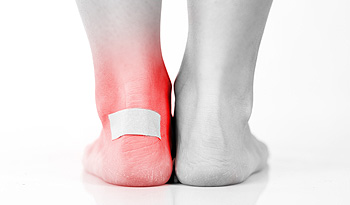 Friction is generally the leading cause of blisters occurring on the feet. The majority of them are filled with a clear fluid; however, if an infection occurs, it may appear to have a yellowish hue. Typically, wearing ill-fitting shoes may cause friction on the skin, usually developing during repetitive motions like running and walking at moderate speeds. Some other causes of blisters may originate from severe burns or tissue damage caused by frostbite, while certain medical conditions including eczema can be linked to blisters on the feet. Treatment may include wearing shoes that fit comfortably without having the toes rub together. You can also apply a gauze pad for protection. If this option is chosen, infection may be avoided by changing the dressing regularly. Relief will be desired if extreme discomfort is experienced, and the blister may need to be drained. Please consider a consultation with a podiatrist for advice and recommendations for treatments of blisters.
Friction is generally the leading cause of blisters occurring on the feet. The majority of them are filled with a clear fluid; however, if an infection occurs, it may appear to have a yellowish hue. Typically, wearing ill-fitting shoes may cause friction on the skin, usually developing during repetitive motions like running and walking at moderate speeds. Some other causes of blisters may originate from severe burns or tissue damage caused by frostbite, while certain medical conditions including eczema can be linked to blisters on the feet. Treatment may include wearing shoes that fit comfortably without having the toes rub together. You can also apply a gauze pad for protection. If this option is chosen, infection may be avoided by changing the dressing regularly. Relief will be desired if extreme discomfort is experienced, and the blister may need to be drained. Please consider a consultation with a podiatrist for advice and recommendations for treatments of blisters.
Blisters are prone to making everyday activities extremely uncomfortable. If your feet are hurting, contact one of our podiatrists of Active Foot and Ankle Care, LLC. Our doctors can provide the care you need to keep you pain-free and on your feet.
Foot Blisters
Foot blisters develop as a result of constantly wearing tight or ill-fitting footwear. This happens due to the constant rubbing from the shoe, which can often lead to pain.
What Are Foot Blisters?
A foot blister is a small fluid-filled pocket that forms on the upper-most layer of the skin. Blisters are filled with clear fluid and can lead to blood drainage or pus if the area becomes infected.
How Do Blisters Form?
Blisters on the feet are often the result of constant friction of skin and material, usually by shoe rubbing. Walking in sandals, boots, or shoes that don’t fit properly for long periods of time can result in a blister. Having consistent foot moisture and humidity can easily lead to blister formation.
Prevention & Treatment
It is important to properly care for the affected area in order to prevent infection and ease the pain. Do not lance the blister and use a Band-Aid to provide pain relief. Also, be sure to keep your feet dry and wear proper fitting shoes. If you see blood or pus in a blister, seek assistance from a podiatrist.
If you have any questions, please feel free to contact our offices located in Fair Lawn, Riverdale, and Englewood, NJ . We offer the newest diagnostic and treatment technologies for all your foot care needs.






